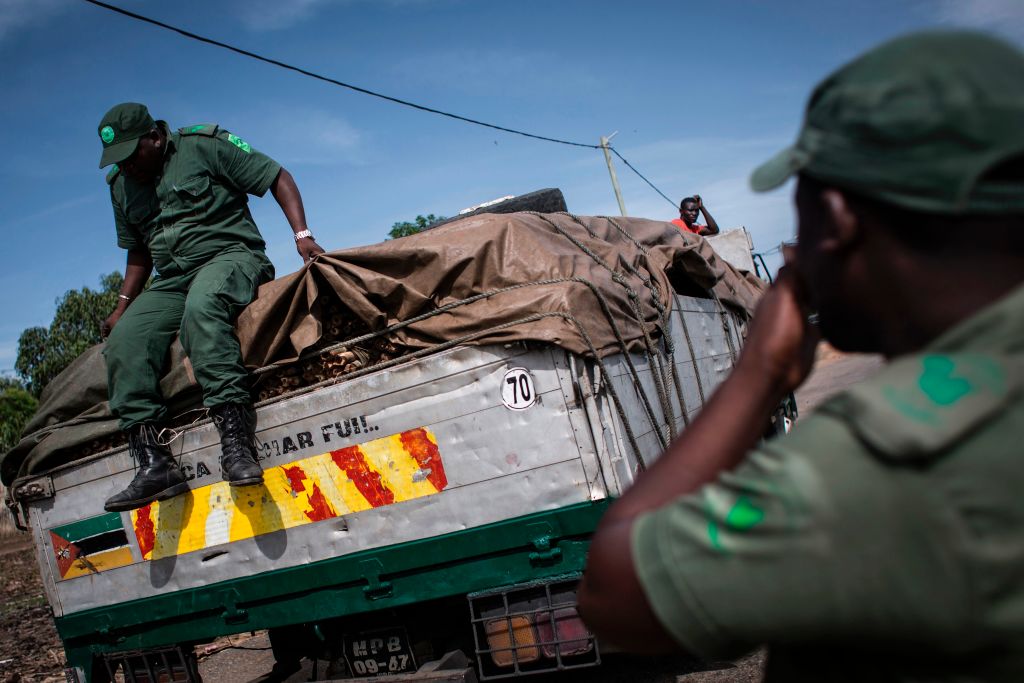Illegal Timber Funds Cabo Delgado Insurgency, Authorities Fear
ADF STAFF
Mozambican authorities are worried that timber smuggling in Cabo Delgado province is funding terror groups such as Ansar al-Sunna, which has led an insurgency there since 2017.
The province is rich in valuable wood species such as umbila, pau preto, pau ferro and chanfuta, but illegal timber smuggling has accelerated deforestation, robbing the government and people of much-needed natural resources and about $1.95 million per month, according to the country’s National Terrorist Financing Risk Assessment Report.
Weak monitoring of conservation areas and local logging companies renting their licenses to foreign corporations, mostly Chinese, make it easier for timber smugglers to thrive, especially in rebel-controlled areas, analysts say.
Cabo Delgado’s illicit timber trade also is linked to human trafficking, causes health risks and uses child labor.
“Although there is no record of … direct links to terrorism, the fact that the smuggling of timber and other forest products takes place in areas with an active terrorist threat suggests that this activity has been a source of income for terrorists,” the National Terrorist Financing Risk Assessment Report said.
Persistent deforestation has led to a loss of traditional livelihoods, which could make it easier for terrorists to recruit new members. Mozambique has lost about 4 million hectares of forest due to unregulated logging and other human actions over the past 15 years, forestry sector experts reported last year.
An expert on Mozambique’s timber trade told War on the Rocks that Ansar al-Sunna, locally known as al-Shabaab, recruits Mozambicans and Tanzanians who make illicit timber sales in port towns such as Mtwara and Pemba, where Chinese traders likely operate.
Much of the illicit timber from Cabo Delgado and around Mozambique is smuggled to China, which has banned domestic logging.
Members of the Natural Resource Management Committee (NRMC) in northern Mozambique told Space for Giants, an international conservation organization, that logging companies routinely rent their licenses to unauthorized corporations that do not follow sustainability measures.
The committee members say these corporations — and timber smugglers who simply operate without a license — cut trees that are too small, engage in uncontrolled burning and are not accountable for replanting felled trees.
NRMC members in the villages of Ntola and Nanhupo said that all authorized timber exploration companies in the area have rented their licenses to Chinese citizens who do the logging.
“We are worried about this because there is a lot of disorder and we do not have a good relationship with the Chinese,” Dinis Atimo, president of the NRMC in Nanhupo, told Space for Giants. “We cannot [demand that] these companies … follow the rules because they are not the ones who have signed an agreement with us.”
Alimo Faque, who lives in the village of Nacocolo, said that renting logging licenses to companies from China and other areas drives disorder in the timber industry and fuels conflict in local communities.
“Foreign companies appear and bring logging promoters, who are invading others’ properties to cut timber without solving community problems such as lack of water sources, among other situations,” Faque told Space for Giants.
In December 2023, members of the United States Justice Department’s Environment and Natural Resources Division and law enforcement officers from the U.S. Forest Service led a timber trafficking workshop in Mozambique. About 25 Mozambican officials participated, including customs officers, forest rangers, national police, magistrates and prosecutors.
Enhanced training of Mozambican judges has resulted in stiffer penalties for illegal logging and poaching.
“Together we can find best practices to fight,” Mozambican Supreme Court Justice Luis Mabote said at the workshop. “We are calibrating our machine against organized crime. Organized crime devises strategies. We need to be prepared. We need technical readiness, and we can’t act in silos.”


Comments are closed.